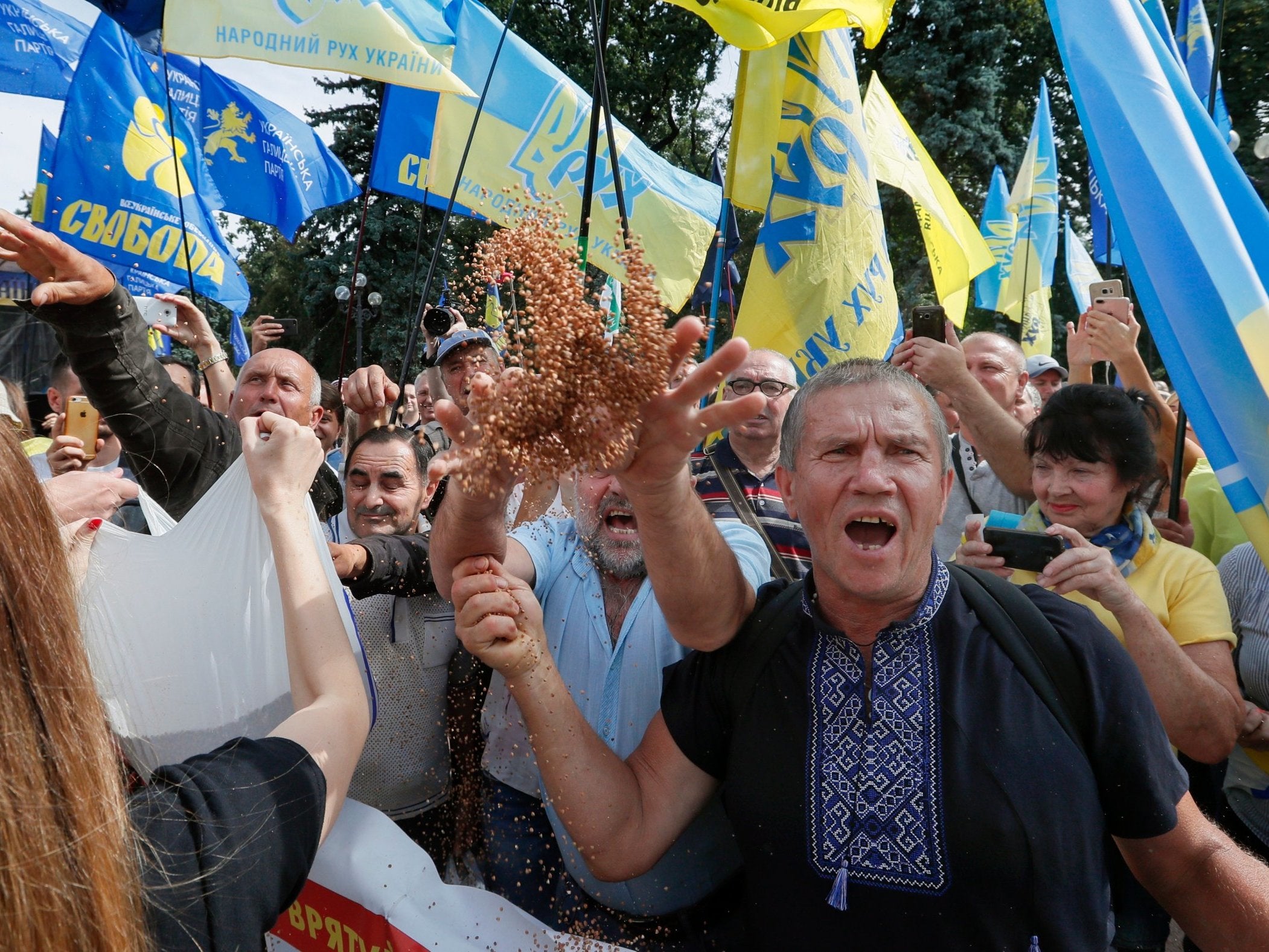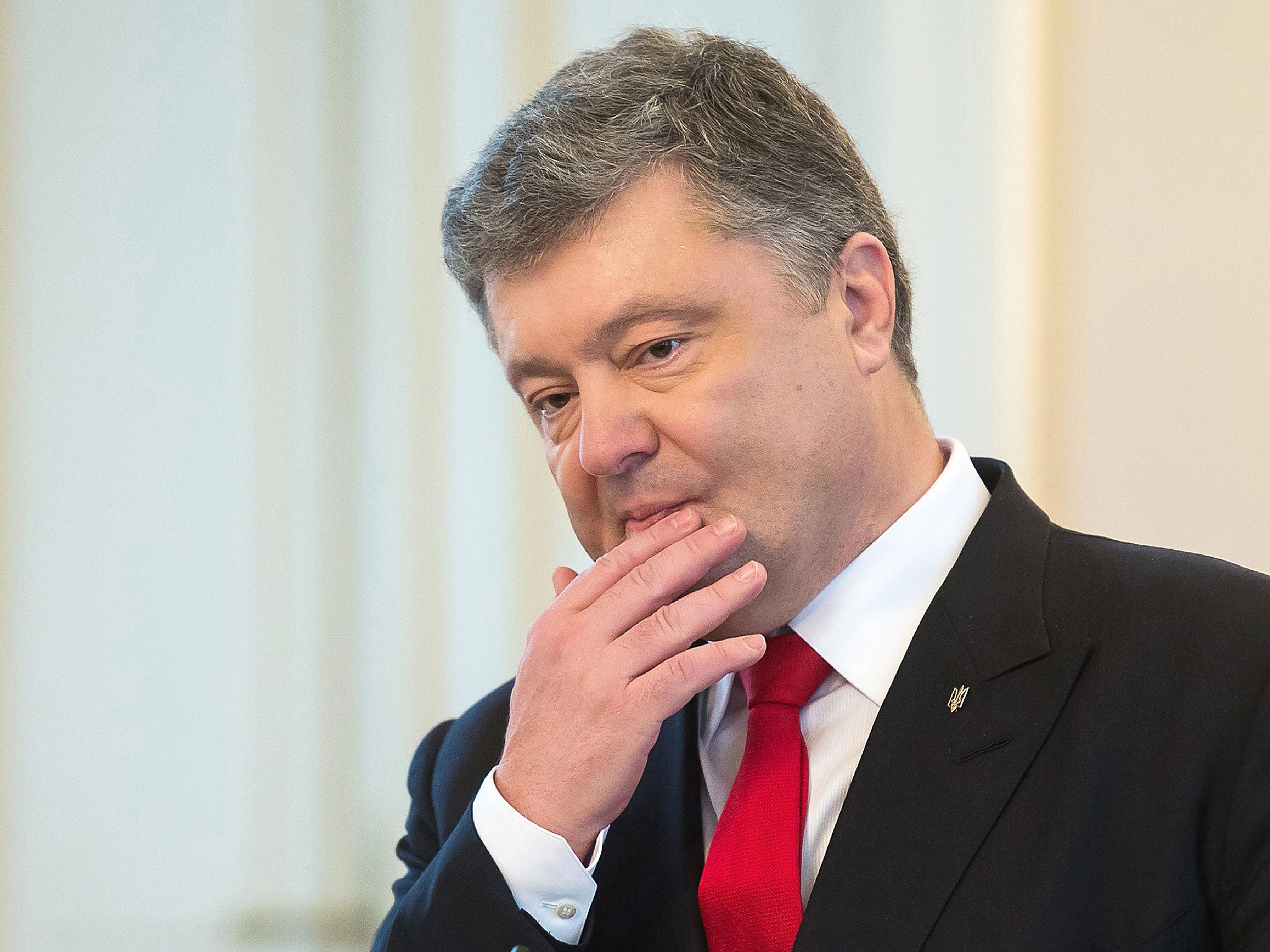Journalism under threat and corruption prevails in Ukraine, despite IMF demands
In Kiev, Kim Sengupta finds corruption claims are muddying the country's journey to democracy

Your support helps us to tell the story
From reproductive rights to climate change to Big Tech, The Independent is on the ground when the story is developing. Whether it's investigating the financials of Elon Musk's pro-Trump PAC or producing our latest documentary, 'The A Word', which shines a light on the American women fighting for reproductive rights, we know how important it is to parse out the facts from the messaging.
At such a critical moment in US history, we need reporters on the ground. Your donation allows us to keep sending journalists to speak to both sides of the story.
The Independent is trusted by Americans across the entire political spectrum. And unlike many other quality news outlets, we choose not to lock Americans out of our reporting and analysis with paywalls. We believe quality journalism should be available to everyone, paid for by those who can afford it.
Your support makes all the difference.The European Court of Human Rights may become involved in a case that will have a profound impact on the freedom of the media in Ukraine and efforts to tackle endemic corruption four years after a revolution that was meant to usher in a new era of transparency and justice.
Natalie Sedletska, a highly respected investigative journalist, sought in the Court of Appeal in Kiev on Tuesday to overturn a court order to hand over her mobile telephone data going back 17 months to the Office of the Prosecutor General. The move has been strongly condemned by US and European Union officials, but the Ukrainian government says it is determined to follow it through.
The prosecutor general, Yuriy Lutsenko, had also sought a similar order against a second journalist, Kristina Berdynskykh.
Although the court stated that the original order of the District Court of Pechersk in Kiev was too wide in scope, it ruled that the prosecutor general would get access to Ms Sedletska’s telephone records. She and her lawyers are now considering taking the matter to the European Court of Human Rights.
Ms Sedletska, who works for the broadcaster Radio Free Europe/Radio Liberty on an investigative programme, told The Independent: “What the court decided is very worrying and sets a precedent. We are now looking at taking the case to the European court; this would obviously have a huge effect on journalists in Ukraine, on maintaining the confidentiality of contacts, especially on stories involving corruption and abuse of power by public officials.”
The aim of obtaining the data is to gather evidence against Artem Sytnyk, the head of the Anti-Corruption Bureau of Ukraine (NABU), who is accused of leaking information to journalists about high-ranking officials accused of political graft.
The issue is of fundamental importance in Ukraine, a country dependent on large-scale international funding to keep afloat. The IMF charges that despite entrenched corruption deterring foreign investors and knocking 2 per cent off economic growth every year, the government of Petro Poroshenko is not doing enough to root out the problem. Ukraine remains 137th in Transparency International’s latest annual global corruption index.
The latest tranche of IMF money, $17.5bn, will be considered for release only after Kiev agrees to independent anti-corruption courts free of political interference, among other measures.
Parliament had passed the legislation to set them up, but inserted an amendment stating that appeals on cases will be handled under the existing system.
This led to intervention by the IMF with its director, Christine Lagarde, announcing that she had spoken to President Petro Poroshenko. “We have agreed that it is now important for parliament to restore the requirement that the anti-corruption court will adjudicate all cases under its jurisdiction,” she said.

Meanwhile, extraordinary levels of embezzlement and fraud, involving tens of millions of dollars, have pitted ministers and officials, including those supposedly enforcing the law, against each other in a web of accusations and recriminations.
Mr Sytnyk is accused of passing on information about a senior prosecutor, Kostyantyn Kulik, who allegedly misappropriated substantial sums of money. Mr Kulik, who remains in his post, strongly denies the allegation.
The initial court order to hand over the telephone records was condemned by the US Embassy, which stated that it would have a “chilling effect on press freedom and anti-corruption efforts in Ukraine”.
The European Union expressed “serious concerns” about the “protection of sources of journalists”, pointing out that the media “contribute significantly to the fight against corruption in Ukraine.”
The Organisation for Security and Cooperation in Europe (OSCE) stressed “investigative journalists play the essential role of a watchdog in society”.
Mr Lutsenko faced prolonged questioning at the recent gathering of a leading international forum, Yalta European Strategy (YES), in Kiev about his legal actions against the journalists while the government fails to pursue powerful individuals through the courts.
The prosecutor general insisted that the telephone records were needed to protect the “privacy and dignity of Ukrainian citizens”. He continued: “We only want to see the locations [of the phones] and nothing else ... I do not have any other choice, I don’t want to do it, but I have to do it.”
Ms Sedletska has rejected an offer of an “off-the-record” meeting with Mr Lutsenko, saying that the only realistic format would be an interview in which the prosecutor general would explain his course of action.
She and her colleagues have had a series of scoops including an undercover documentary filmed in Britain, From Russia with Cash, which charted how money laundered from Eastern Europe had helped fuel London’s luxury property boom.
Ms Berdynskykh of the Novoye Vremya magazine, said: “It is plain that an attempt is made to pressurise journalists, to stop people from coming forward with information.
“How can I say to my contacts that I will not reveal their identities when this is being done? And while they are going after journalists, you have powerful people in authority who are getting away with corruption. That is a very bad situation for Ukraine.”
Ten journalists have been killed in Ukraine since the Maidan protests of four years ago overthrew the pro-Moscow president Viktor Yanukovych.
Others in the media have been targeted by the authorities. Just a few months ago, a bill was proposed in parliament granting prosecutors and the National Security and Defence Council powers to block websites deemed a threat to the state without a court order, although the proposal is now being reconsidered by MPs.
Risks faced by whistleblowers would grow, say the journalists, if the Court of Appeal upholds the ruling on telephone records. The threat is already very much there as the horrifying experience of Kateryna Gandzuik illustrated.

Oksana Grytsenko and Oleg Sukhov from The Kyiv Post reported how the municipal official from Kherson was left with terrible injuries after an acid attack a month ago. Two anti-corruption activists had already been assaulted in the same city before battery acid was flung at Ms Gandzuik outside her home.
She had been exposing organised crime and illegal trading in the area. Her friend Sergei Nikitenko, a journalist who was himself beaten up after looking into official malpractice, said a lack of any real police investigations has created an atmosphere where anyone not protected by vested interests was vulnerable.
After repeated warnings that local police cannot be relied on to carry out a proper investigation, the prosecutor general handed over the case to the national security service, the SBU, and the inquiry resulted in the arrest of four men, including Sergiy Torbin, a former police officer.
Some of the suspects were former fighters of the Ukrainian Volunteer Army, which had links with the hard-right group, Pravy Sektor, a hard-right nationalist group that came to prominence in the conflict against Russian-backed separatists in the east of the country.
All the defendants, except Mr Torbin, have admitted involvement in the attack on Ms Gandzuik.
But investigations into politicians and senior officials are often stopped or run into the sand. One of the most high profile of these was the recent decision to close a case of alleged fraud against Gennady Kernes, the mayor of Kharkiv, who was facing claims of stealing $984m from a programme to allocate state land.
Asked about that decision at the YES conference, Prosecutor General Lutsenko said it was “illegal ... that judge retired the next day. I am requesting an investigation and will ask the appeal court Fto rule on it.”
Opposition politicians claim that the charges were dropped because Mr Kernes, the boss of Ukraine’s second largest city, has secretly agreed to back President Poroshenko and his party in the coming parliamentary and presidential elections. This is denied by the prosecutor’s office.
Mr Kernes is no stranger to the violent intrigue of Ukrainian politics. In April 2014 he was shot in the back. At the time he had been backing President Yanukovych and banning opposition rallies. There were various theories as to who may have been responsible for the assassination attempt. Mr Kernes blamed Arsen Avakov, who had become interior minister in the post-Yanukovych government.
Mr Kernes and two of his bodyguards were charged with kidnapping and torturing two activists in January that year. The charges were dropped and he again blamed Mr Avakov, claiming the minister had fabricated evidence against him.
Mr Avakov strongly denies the claims. But he too has faced corruption allegations, fleeing the country when facing charges during the Yanukovych era. He claimed that the prosecution was politically motivated and has consistently denied subsequent allegations of malpractice.
In October last year, Mr Avakov’s son, Oleksandr, was detained, along with former deputy interior minister Serhyi Chebotar, by NABU investigators over an embezzlement case regarding backpacks purchased for the Ukrainian armed forces. His father’s Ministry of Interior described NABU’s actions as “political and not legally grounded”.
Two months ago the Specialised Anti-Corruption Prosecutor’s Office (SAPO) which operates separately – and at times in rival – with NABU, closed the case against Oleksandr Avakov and Mr Chebotar. NABU has asked the head of SAPO, Nazar Kholodnystski, to reopen the case, so far without success.
Join our commenting forum
Join thought-provoking conversations, follow other Independent readers and see their replies
Comments